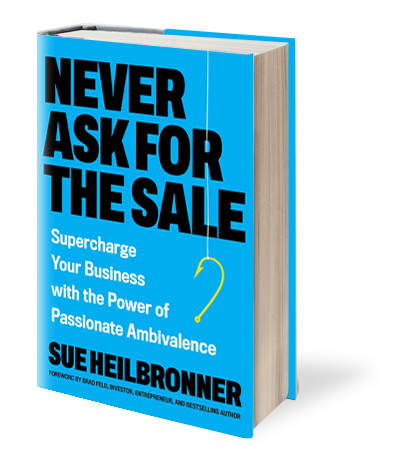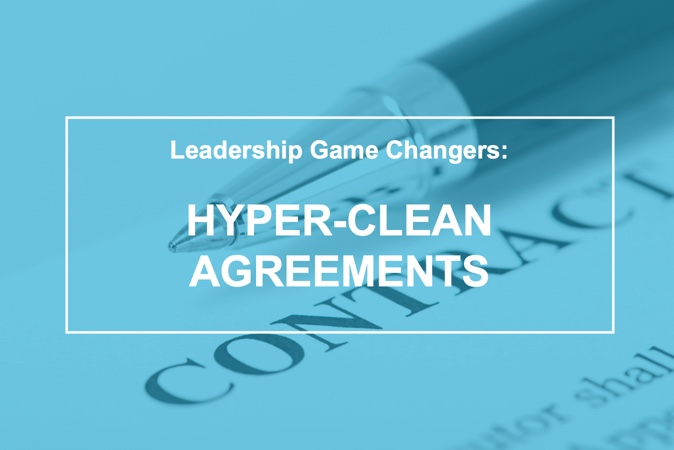There Has Never Been a Better Time for Hyper-clear Agreements
We talk a lot here about the value of Clean Agreements for conscious leaders. But it has never been more obvious to me that now is the best time I can remember to double down on this conscious leadership choice. While you’re at it, I’m going to recommend also upping the ante on Conscious Communication.
Here’s the thing. As of this writing, hundreds of millions of people around the world, including 150 million Americans, are being either advised, ordered, or both to shelter in place. We are staying at home if we do not have an “essential” job in this new COVID-19 environment. We are working from home if we are able and if our company is continuing to operate and employ us. Our children are not in school. The news seems to get more and more unsettling about the risks of both contracting and spreading the virus. Many of us have other stresses, including lost work, reduced income, the potential closure of businesses we founded, and the inability to secure medical care for matters other than the virus. It’s stressful, and we all process stress differently.
Some people are reacting to current life by going to the beach for spring break. Some people are reacting by not leaving their homes at all. I’m in the latter camp, but whatever your situation is, you likely have way more uncertainty in your life. We all do, and there is only so much we can manage. I’m going to avoid diving into the issues around control here and stick with a clear suggestion for how we can use our current reality as a way to create more predictability, understanding, and fulfillment in the short and the long-run using COVID-19 as our petri dish (sorry).
First, go read that blog post about clean agreements I linked to above. Those of us who are hunkering down with at least one other person are getting a chance to confront differences of opinion that are completely new. Whatever the law has not precluded is up for grabs.
- Do we go to the bank or wait to deposit a check?
- Is the grocery store okay or should we use a delivery service?
- If we do the grocery store, can we go as often as we want or limit our trips?
- Even if we use a delivery service for groceries, how should we handle the groceries before we bring them into our house and put them away?
- Is our high school aged son allowed to go see his girlfriend if they stay six feet from each other? Do we even think it’s possible for aforementioned son to stay six feet from his girlfriend after not seeing each other for a week?
- What about shared custody of children? How do we view kids moving from one home to another?
- When we take that walk in the neighborhood, is it enough to move a couple of feet to the right on the sidewalk or is it best to cross the street?
- What about the grandparents?
If we’re hunkering down solo but still working from home with others who are doing the same, a similar set of questions emerges. We wonder about use of other devices during Zoom calls, using video or not during our calls, handling other new inputs at work like the naptime of a three-year-old in the next room.
From where I’m sitting, this is the time to treat this situation as an Olympic-grade training facility for making agreements. One of my best friends said “the Coronavirus reveals all.” And it’s true in so many ways, one of which is that it is surfacing gaps in our shared understanding. These cannot easily be elided when we are all sharing physical space and increased emotional interdependence. So let’s become agreements ninjas.
First, identify what you need or want. Then, embark on an open discussion with your loved ones (at home or at work) using conscious communication (see that linked post above) and conscious listening.
I learned this one the hard way last week. I realized I was feeling scared. My partner was making choices that felt unsafe to me. My partner’s son was being more loose than I felt made sense. I wasn’t sure what authority I had with him as a non-parent. I wasn’t sure what was happening at the teen’s other house that was now more connected to us than at any other time. Instead of sharing my needs, I shamed myself. I told myself I was being overly reactive, unfairly controlling, irrational. My inner critic believed that whole story because I can be controlling. I can overreact. It got so bad for me that I was going to leave my partner’s home. I was going to rent a car and drive from San Francisco to Boulder to be in my house, where I could control all of the inputs.
Right before I left, I phoned a friend. She reminded me that it might be wise before bailing to try telling the wonderful humans around me exactly what I wanted. Instead of beating myself up for being cautious, I could take a moment to realize that again and again in this crisis, my mindset has been about five days ahead of the general mindset. I could actually see my reactivity as an advantage instead of a source of self-blame.
So I tried it. I told my man what I would need to feel safe. I asked my man’s son if he would abide by my rules around outside activities (the California governor later made this way easier by legislation). I even phoned my partner’s son’s mom and husband to discuss together how we could manage all of our preferences and needs. They were open, helpful, and appreciative of this outreach. We were in sync quickly and easily.
I have a set of agreements with my people, and it has given me a new sense of freedom and ease. Many have been satisfactorily negotiated. All have had input from all of the stakeholders (though as with business decision rights, parental decision rights have been influential here). We are clear.
I am watching leaders do the same thing with their teams: setting expectations, making tight agreements, renegotiating agreements as circumstances change, and thinking at the same time about the individuals and the community that our choices affect.
I am writing this because every conscious leadership coaching client of mine has expressed disparities in their circles about how this is all being handled. We could elide these differences. We could turn away. We could isolate ourselves from the people we care about most. We could suffer. Or, if we want, we could use this as the best experiment ever to improve communication with our partners across every area of our lives.
Give it a try, and take good care.

